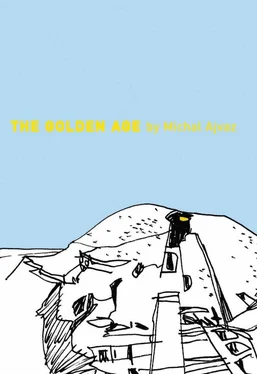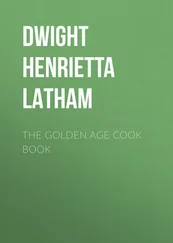Michal Ajvaz - The Golden Age
Здесь есть возможность читать онлайн «Michal Ajvaz - The Golden Age» весь текст электронной книги совершенно бесплатно (целиком полную версию без сокращений). В некоторых случаях можно слушать аудио, скачать через торрент в формате fb2 и присутствует краткое содержание. Год выпуска: 2010, Издательство: Dalkey Archive Press, Жанр: Современная проза, на английском языке. Описание произведения, (предисловие) а так же отзывы посетителей доступны на портале библиотеки ЛибКат.
- Название:The Golden Age
- Автор:
- Издательство:Dalkey Archive Press
- Жанр:
- Год:2010
- ISBN:нет данных
- Рейтинг книги:4 / 5. Голосов: 1
-
Избранное:Добавить в избранное
- Отзывы:
-
Ваша оценка:
- 80
- 1
- 2
- 3
- 4
- 5
The Golden Age: краткое содержание, описание и аннотация
Предлагаем к чтению аннотацию, описание, краткое содержание или предисловие (зависит от того, что написал сам автор книги «The Golden Age»). Если вы не нашли необходимую информацию о книге — напишите в комментариях, мы постараемся отыскать её.
is Michal Ajvaz’s greatest and most ambitious work.
The Golden Age
The Golden Age — читать онлайн бесплатно полную книгу (весь текст) целиком
Ниже представлен текст книги, разбитый по страницам. Система сохранения места последней прочитанной страницы, позволяет с удобством читать онлайн бесплатно книгу «The Golden Age», без необходимости каждый раз заново искать на чём Вы остановились. Поставьте закладку, и сможете в любой момент перейти на страницу, на которой закончили чтение.
Интервал:
Закладка:
At this moment there was a gentle whir and the wheels of my clock-prison sprang back into motion; as they released their grip it seemed to me they gave me a friendly tickle. I could still hear the excited voice of the woman.
“…in the morning the virgin queen will breakfast on her balcony while you and her sister do the same on the balcony opposite. The queen will raise her right hand to you in greeting and you will return the greeting with your left. The birds will sing. It will be beautiful. I can hardly wait for your arrival; flags will fly throughout the town in your honour.”
Fortunately this was the moment at which the first red geyser spurted from the swollen shell. Karael jumped up nimbly and was the first to catch the juice on the ink sponge. The shell ruptured in other places, too, and the juice burst forth in torrents which the guests caught in their bowls. So I ceased to think of clocks adorned with cherubs, of a poisonous flower and a queen; I, too, took up my bowl and caught the delicious juice; I, too, sipped the liquid and nibbled on the bowl. The sun had almost reached the level of the sea and the wall of water blazed an incredible crimson. Thus ended one of my days on the island.
First encounter with the Book
The story I told at the feast was no doubt influenced at least a little by the island’s Book , although for a long time I found this maze of adventure stories, fairy tales and myths about rabbits, princes and princesses, whose descriptions, insertions, digressions, improbabilities and anachronisms knew no end, quite insufferable. It took me far longer to find in it something that appealed to me than it did to get used to the island’s cuisine and its board games without rules. Now is perhaps the time for me to say something more about the Book , which I have mentioned a number of times already. I confess that I have kept putting off talking about the Book because I don’t have much of an appetite for it, but having discussed board games and food I can’t think of anything else of particular interest: I will just have to tackle the Book here and now.
The main reason for my avoiding writing about the Book was the fear that I would lack the strength to negotiate its labyrinth, which has become yet more intricate since the time it left the island and settled in my brain. I found the Book puzzling enough when I read it on the island, and then I had no idea of its extent; indeed, it is unlikely that I even discovered what was its main part. Since then it has become even more difficult to survey, having become something of a hybrid, in which pages woven from the fine fibres of memory and pages born in the realm of dreams sit side by side. When I think of the Book I see its long insertions emerging from the blurred landscapes of memory, stretching to infinity as they grow around tremulous pictures produced by the imagination. Dear reader, I believe I told you in the first chapter of this book that I was looking forward to wandering in ghostly realms ruled by the triumvirate Memory, Dream, and Desire, and to having adventures there; but now, having reached the twenty-ninth chapter, I am feeling very tired. I hadn’t realized how exhausting it is to wade about in the swamp of memory.
As I said, the islanders took no great interest in art. After the apotheosis of the Stain, when the building efforts of the Europeans in the lower town ceased, no architecture existed on the island. The islanders needed no temples or offices. Sometimes they would build a simple house on the islet of rock on which the upper town was accommodated, but, as the island population was in decline and no new houses were needed, they tended to repair old dwellings instead. The islanders had no painting and sculpture (which is perhaps surprising considering the great roles these play in the story-lines of the Book ); they were satisfied by the shapes of stains, the movements made by the shadows of leaves on walls, the ever-changing white figures described by the foam of the waves of the sea. They had no music because it was enough for them to listen to the rustlings of the island; indeed, in the tapestry of island sounds there was no tear by which music could enter.
For a long time I believed that the islanders cultivated no art at all. But one morning, having awoken in Karael’s house, lying there with my eyes closed, listening to the chatter and trickle of water, I realized I was hearing occasional sounds which escaped the classifications I had established for familiar island sounds. A sound kept returning that reminded me of the opening of a Velcro, or a cookie being bitten into, and this was usually followed by the kind of sound made by a cloth fluttering in the wind or the rapid flapping of a bird’s wings; the third sound was a light swish or perhaps a quiet sigh. I tried to guess what was making these sounds, but the only idea that came to me was the improbable one of a sorrowful bird groaning in pain, pecking intermittently at a cookie and flapping its wings. I got up and walked through the wall of water to the stone terrace. There I saw something that surprised me more than the sight of a sorrowful bird nibbling cookies would have done: Karael was sitting on the terrace reading from a large book which was lying on the stone table in front of her.
I sat down next to her and watched. I saw that the pages of the book were neither stitched nor glued to a spine, that they were gathered like those of a children’s foldout picture book, and that they were written on one side only. At a number of places on a page there was some kind of paper patch-pocket attached; these pockets looked a little like ears or mushrooms. At certain places in the text there was another kind of attachment: a thin strip of paper which became wider and thicker two or three centimetres along to form a kind of oval (the cap of a mushroom) whose axis (the stalk of the mushroom) was perpendicular to the paper strip. The upper side of the oval was sealed along its whole length and contained a number of slits. Although Karael paid no attention at all to some of the pockets, others she opened (this was the sound that had reminded me of Velcro or the crunching of cookies) and pulled from them a small pleated strip of thin paper. This strip, too, had attachments like those I’ve just described, and some of these (somewhat smaller) ears, too, Karael opened, pulling out more paper concertinas with ears. I looked on in amazement, trying to work out how many levels the book had. I counted six, but even at the sixth level there was a little ear jutting out; there was no way of telling how many more concertina strips with ears were hidden within it.
At some moments all the concertinas were folded inside the pockets; at others Karael would have left open several pockets simultaneously, having opened out not only the strips which they had contained but also some of the strips which these gave issue to. Whenever there was a gust of wind, all the concertinas were lifted up and began to flutter (explaining the sounds of bird’s wings), reminding me of those little flags we used to wave on May 1 st. When the wind dropped, the concertinas lay limp across the table, their ends hanging over its edges and shivering (the murmuring, whispering, sighing sound).
A short time later Karael carefully folded all the concertinas back into the pockets and closed the book. But her agitation remained inside the book; indeed it was even more obviously present when Karael’s hand was not on it. Inside the closed book, the ears formed a bump which reached its highest point in the book’s centre. The front cover — which was not joined to the back cover by means of a spine, only by the round shape of the largest paper concertina (the only one which did not belong in a pocket) — rocked from side to side ceaselessly. I was concerned that the book would topple, and this indeed happened, the front cover tipping over slowly to the ground, the paper concertina unfurling in an arc, leaving the ears so shamelessly exposed that I turned my eyes away.
Читать дальшеИнтервал:
Закладка:
Похожие книги на «The Golden Age»
Представляем Вашему вниманию похожие книги на «The Golden Age» списком для выбора. Мы отобрали схожую по названию и смыслу литературу в надежде предоставить читателям больше вариантов отыскать новые, интересные, ещё непрочитанные произведения.
Обсуждение, отзывы о книге «The Golden Age» и просто собственные мнения читателей. Оставьте ваши комментарии, напишите, что Вы думаете о произведении, его смысле или главных героях. Укажите что конкретно понравилось, а что нет, и почему Вы так считаете.












